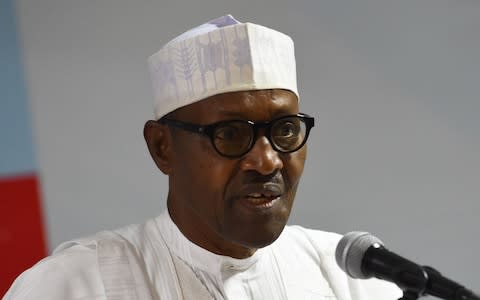'There will be no election for me': Week-long delay leaves many Nigerian voters in wrong place to cast their ballot

Felix Wilson is crushed into the window seat with bags piled high on his lap as the rammed bus bumps along its 14-hour journey from Calabar to Lagos.
“I work as a salesman in Lagos, but all my family are in Calabar,” he says. “That was where I was living when I registered, that's where I am supposed to vote.”
Mr Wilson, like thousands of Nigerians, dipped into savings and took time off work in order to travel home last Saturday.
Nigeria’s roads are at their busiest come election time as regulations demand voters return to the state where they first registered to cast their ballot.
The journeys - in a nation four times the size of the UK - can be marathon.
And they can be dangerous: Nigerian soldiers are on active deployment in 30 of the country’s 36 states, dealing with everything from Boko Haram in the far north to secessionists in the south.
Last Saturday , in one of the largest ever democratic exercises on the African continent, thousands of positions from the presidency to state legislature were due to be on the ballot paper.
Yet it was not to be.
Hours before the sun rose the country's Independent Electoral Commission (Inec) issued an 11th hour communique delaying the ballot for a week. They cited a number of reasons, including problems in delivering ballot papers.
As incumbent president Muhammad Buhari and his challenger Atiku Abubaker traded barbs on who was behind the the delay, thousands of voters arrived home to discover they were too early to vote.

The delay left many like Mr Felix, 28, in a difficult position.
He only found out about the postponement after his arrival last week. Now he has been forced to return home, and go back to work.
“I took two days off work to travel, and to exercise my democratic right. I only found out the election was delayed after I got to Calabar. Now I have to go back to work.”
“I don't think I'll be able to return for Saturday– flying is too expensive, and the bus takes too long”.
“There will be no election for me,” he quips.
Others did not accept their fate so easily and took to social media to crowdfund second trips home or begged for more time off work.
One prominent figure, Reno Omokri, a former spokesperson for previous President Goodluck Jonathan, put on free transportation for a number of those hoping to travel to vote – he called the initiative “Buses to Democracy”.
The country's information ministers Lai Mohammed said that local petrol suppliers would temporarily drop their prices in the days leading up to the re-arranged vote.
A handful of wealthy individuals offered to refund expenses if travelers tweeted a picture of a receipt.
Shakir Akorede of BudgIT Nigeria, an organisation that works on transparency and citizen engagement in the country, said the delay could dampen expectations for record turnout.

For all it's faults, there were reasons to be optimistic about the Nigerian democratic process in 2019, he said, pointing to a huge rise in the number of registered voters this year – 84 million – up from just 68 million at the last election in 2019.
“I personally have friends from travelling home from Europe and the US just to vote - that's a positive thing”.
“It will be hard in all honesty, to have the same numbers of voters travelling this weekend as last, it's going to increase apathy,” he warns
“People register to vote in hometowns for many reasons, so they can have a say in the governance of their home state, or just so they can visit their families.”
“Someone travelling to Kano or Maidaguri from Lagos could spend 18 hours on a bus, they've cut through all this, they can't just take another week of holiday – it [the delay] is irresponsible”.
The costs are not just democratic, Ken Ukaoha, president of the National Association of Nigeria Traders assessed that the week long delay had cost the economy some 350 billion Naira.
Elections in Nigeria in have been plagued by low voter turnout and varying scandals in recent years. The 2015 presidential vote saw only 39.15% turn out - it too was delayed by several weeks over security concerns.
The run up to this years' ballot also featured prominent warnings against voter fraud and the theft of ballot boxes. President Buhari went as far as saying that those caught stealing ballot boxes should pay for it with their lives.
For some, vote rigging is more of an expectation than a fear.
But if Saturday's turnout is as disappointing as previous years, in spite of record registration levels, it may be an antiquated voting system that is to blame over any snatched ballot boxes.

 Yahoo News
Yahoo News 